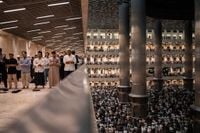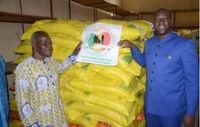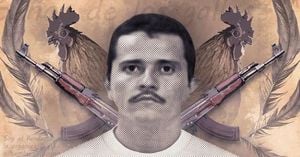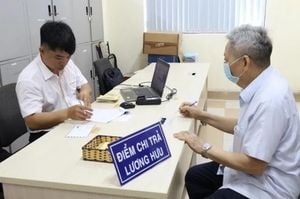As Ramadan unfolds across various regions, communities are coming together to celebrate the holy month through acts of solidarity and support. From Togo to Mali, and even across the United States, these gatherings not only foster spiritual reflection but also serve to strengthen social bonds among diverse populations.
In Togo, a West African nation with a significant Muslim population, Ramadan events play a crucial role in enhancing social cohesion. Recently, the Turkish Cooperation and Coordination Agency (TIKA) organized a "Joint Iftar and Solidarity Program with Orphans" in the capital city of Lomé. This event was a heartwarming gathering, bringing together over 500 attendees, including Turkish citizens residing in Togo, local partners of Turkish institutions, senior Togolese officials, and many orphaned children. The event was held at the Maarif Foundation Togo Schools campus, where special playgrounds were set up for the children, allowing them to enjoy the festivities in a joyful atmosphere.
During the event, key figures such as Muteber Kılıç, the Ambassador of the Republic of Türkiye in Lomé, and Hasan Taşçı, a member of the Board of Trustees of the Turkish Maarif Foundation, shared their Ramadan greetings. They expressed hopes for strengthening Türkiye-Togo relations through such communal efforts. Kılıç emphasized the importance of unity during this holy month, stating, "Events like these remind us of our shared humanity and the importance of supporting those in need."
Meanwhile, in Mali, another significant initiative has been underway since the start of Ramadan on March 1, 2025. The Malian government launched Operation "Sounkalo Solidarité," aimed at fostering solidarity among its citizens. This initiative encourages people of all faiths to gather every afternoon at 6:00 p.m. to share meals, breaking their fast together. This year, the initiative holds special significance as Ramadan coincides with Lent for Christians, creating a unique opportunity for interfaith collaboration.
Across 61 locations in the country, 300 food packages are distributed daily, allowing thousands to partake in this communal meal. Local authorities, NGOs, and citizens come together at designated sites, such as football fields and mosques, to share food and fellowship. On March 4, the President of the Republic's Commissioner for Social Works delivered food packages to various religious organizations, while on March 13, the Minister of Religious Affairs, Mahamadou Konè, provided an additional 50 tons of rice to both Muslim and Christian communities.
Konè remarked on the initiative's significance, saying, "In this blessed month, our commitment to supporting vulnerable populations through religious structures is crucial for fostering peace and unity." The ongoing civil unrest in Mali, which has persisted since 2012, has made such initiatives even more vital for community cohesion.
In the United States, the community in Altadena, California, is also navigating the challenges of Ramadan after the devastating loss of their only mosque, Masjid Al-Taqwa, due to wildfires. As the community prepares to celebrate Eid al-Fitr, they are finding ways to maintain a sense of normalcy for both children and adults. The mosque, founded over 40 years ago by Black Muslims, has been a multicultural hub for many families.
Despite the loss, community members have come together at a local school to hold iftars, the evening meals to break the fast. Daarina Abdus-Samad, a community leader, has been instrumental in organizing these gatherings, ensuring that children can still participate in Ramadan traditions. "We want to create a nurturing environment where kids can feel the spirit of Ramadan, even if our physical space is gone," she explained.
Children are actively involved in preparing for the upcoming Eid celebrations, painting murals and decorating bags for gifts. Abdus-Shaakoor, a long-time member of the community, shared her thoughts on the resilience of the group: "Despite the losses, we are determined to keep our traditions alive and support one another through this difficult time." The community's efforts highlight the importance of togetherness in overcoming adversity.
In Indonesia, the Istiqlal Mosque in Jakarta, Southeast Asia's largest mosque, has become a sanctuary for worshippers seeking spiritual contemplation during the final 10 days of Ramadan. Hundreds of Muslims have gathered to observe iktikaf, a practice of retreating to the mosque for prayer and reflection. Djufri Tjikoe and his wife, Elia, traveled all the way from Manado, North Sulawesi, to participate in this sacred tradition. Their journey began on March 17, as they set sail before continuing by train to Jakarta.
Djufri expressed the significance of this retreat, stating, "This is my first time dedicating the last days of Ramadan to iktikaf here, and it feels incredibly special to be part of this community of worshippers." Elia, who has participated in iktikaf for years, noted that the experience allows them to disconnect from daily distractions and focus solely on their faith.
As Ramadan progresses, these diverse gatherings across Togo, Mali, the United States, and Indonesia illustrate the profound impact of shared experiences in fostering community bonds. Whether through communal meals, spiritual retreats, or support for those in need, these events embody the essence of Ramadan—a time for reflection, unity, and compassion.
Ultimately, the spirit of Ramadan transcends geographical boundaries, reminding us of our shared humanity and the importance of coming together in times of need. As communities navigate the challenges of the present, they continue to uphold the values of solidarity and support that define this holy month.








